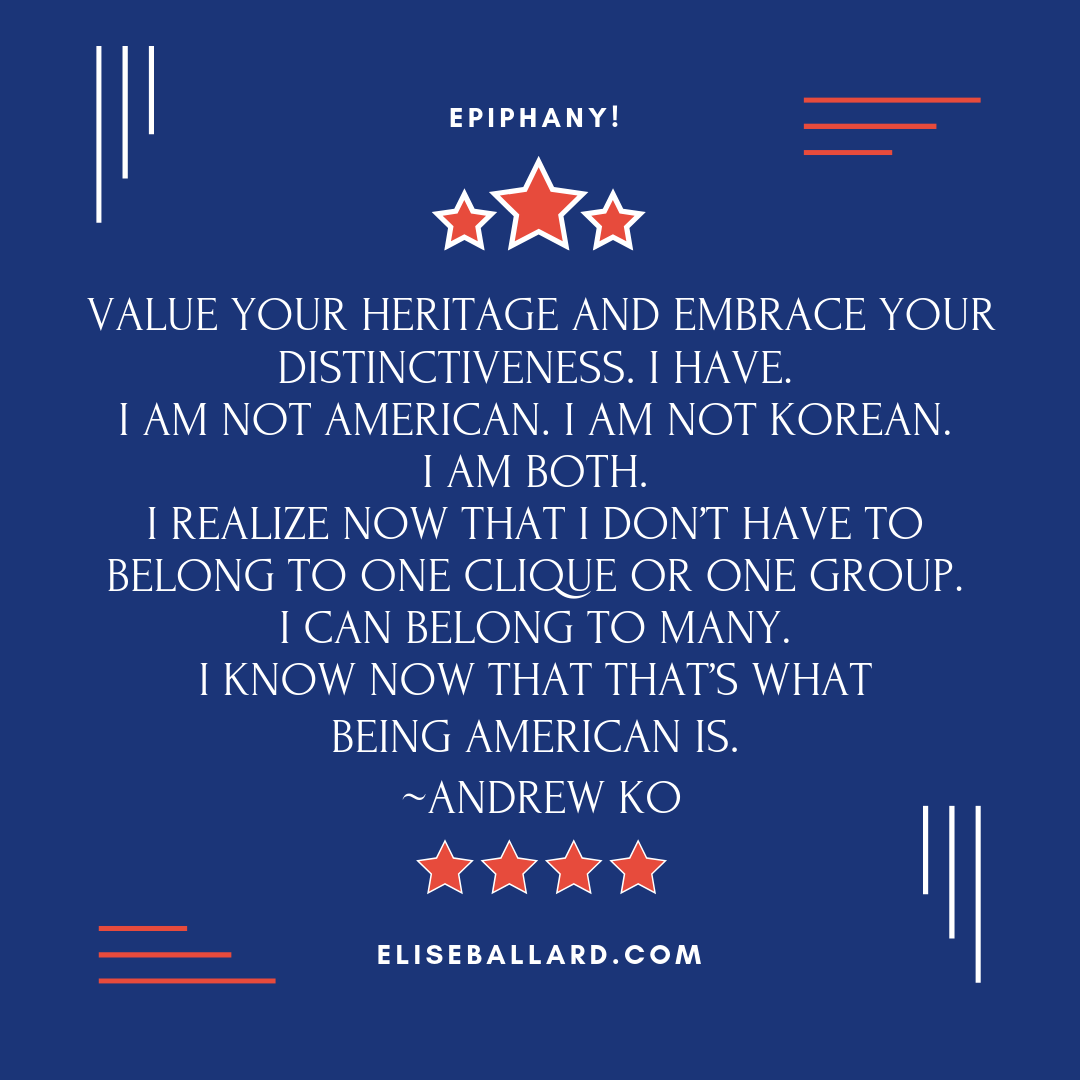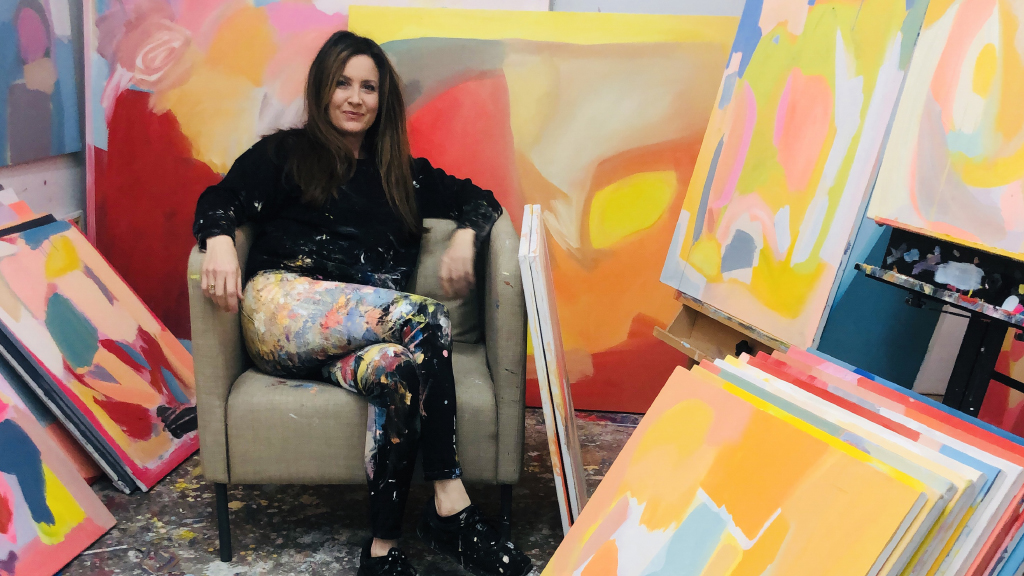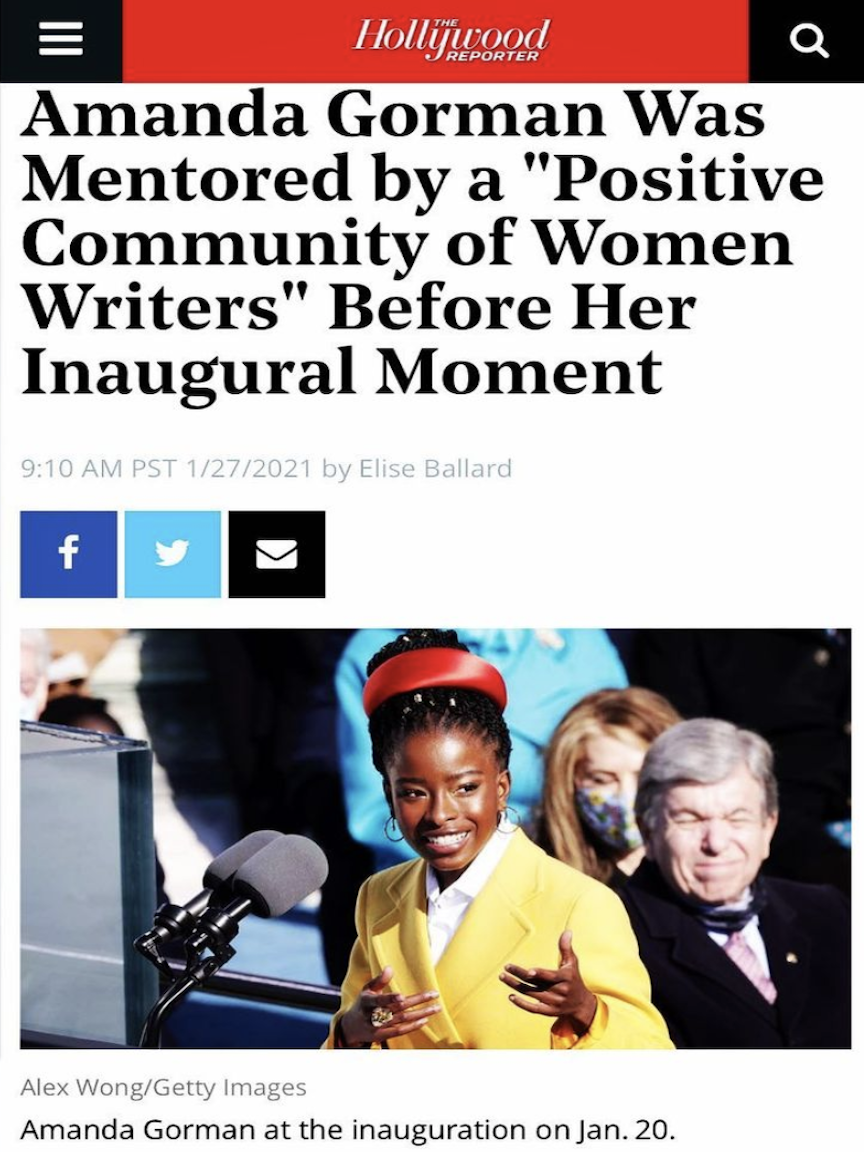
What I have realized, and I guess you could say the biggest epiphany about my life, is this: Value your heritage and embrace your distinctiveness. I have. I am not American. I am not Korean. I am both. I realize now that I don’t have to belong to one clique or one group. I can belong to many. I know now that that’s what being American is. ~Andrew Ko
With all the discussion and debate about immigration lately and as we celebrate and think about what it means to be an American this time of year, Andrew Ko felt like his epiphany story was a great one to think about right now and I agreed. So here you go, Andrew Ko’s, a first-generation Korean immigrant, greatest epiphany in life as told to me. I hope you find it as powerful and thought-provoking as I do.
*******
In the early seventies my parents immigrated to America from South Korea. My father was an engineer, my mother a teacher. They came to the U.S. with $100 in their pocket and had to completely start over. My father needed to have an engineering degree from here, so he washed dishes in the evenings, then went to school in the mornings. My mother worked as an assistant in a nursing home, basically cleaning up after elderly people, and then she went to work on an assembly line. It’s a very typical immigrant story. They started out in El Paso, Texas, where I was born, but later moved to the suburbs of Maryland, where I was the only Korean in my school. Although my grandmother immigrated to the U.S. to help care for me, I was definitely a latchkey kid.
Growing up, I would come home and take my shoes off before I came in the house, where we spoke only Korean and ate only Korean food, and this was very normal to me. Then when I’d go to school, everything I did was very American. I spoke and read English, and ate things like grilled cheese sandwiches—grilled cheese is definitely not a Korean staple. And this was normal to me too, so it was objectively strange, but this double life felt natural.
One of my earliest memories is this: I was five or so and some of my neighborhood friends came over to play. They acted kind of funny when they had to take their shoes off when they came into my house. To do that is a very common, everyday tradition in many Asian countries, but none of my friends knew about it. At that moment I felt like my family was strange. We were different. That was when I realized I wasn’t necessarily “American.”
Growing up, this feeling stuck with me—and it wasn’t negative. I just never really felt completely American. There were little things like those standardized tests you take in school, which ask you to mark yourself as white, black, Asian, Pacific Islander. I never knew what that meant. Pacific Islander? I thought, “Where’s the one that just says I’m American?” There wasn’t that box to check.
Fast-forward to 1997, when I was twenty-six. This was during that awful Asian financial meltdown, when whole countries faced collapse, and I worked in management consulting. I really felt that I should go to Korea and help during this crisis. I changed my job for one that would send me over there to consult with Korean banks. I was on my way to “help my people.” Or so I thought.
Literally, during the final airport approach of that fifteen-hour flight, I was struck by an overpowering realization: “Oh my God. I’m not really Korean.”
I had only been there once, in high school during the Olympics in 1988—a vacation, really. I couldn’t speak the language well and didn’t know how to read or write in Korean. I might “look like them,” but I didn’t know their everyday culture. And here I was, going to go advise these massive banks and their government on how to restructure their bad loans and toxic assets . . . what was I thinking? Sure enough, after I landed, it was very much a foreign country to me. I suffered anxiety for many months, self-conscious about the fact that I seemed Korean but really wasn’t.
What was I, in fact?
I lived and worked in Korea on this project for two and a half years, and since then have also worked in many other countries. What I have realized, and I guess you could say the biggest epiphany about my life, is this: I am not American. I am not Korean. I am both. I have fully internalized the fact of my blended background and am very proud of it now. I have the best of both worlds: I am very much an American because of the way I grew up, my education, friends, and so on. And I have deep roots back in Korea: my wife is Korean, and that culture, its cuisine . . . it’s all a big part of my life. I understand now that being an American is about who I am on the inside and transcends, yet includes, my family’s background and culture, what I look like, and the language I speak.
When I got back from living in Korea and had this realization, I started getting involved with politics. Asian American communities are, generally speaking, very hardworking and introverted. They don’t speak out a lot. But I think that’s the beauty of this country—we have that right. We can call the authorities out. If we’re unhappy with the current administration or something else, we have the ability to do something about it. That wasn’t true in South Korea until quite recently. I’ve lived and worked in numerous countries that do not have very open systems, politically or economically, much less decent living conditions. Some lack clean running water and suffer staggering pollution. The corruption I’ve seen in some places makes American scandals seem almost naive. Of course, the U.S. is far from perfect—but honestly, for every imperfection we complain about here, I could probably give you ten examples of how much worse it is in other countries. And the wonderful thing here is that what we don’t like, we can actually do something about. In other places it’s a lot harder and sometimes pretty dangerous. I think a lot of people don’t appreciate how great we have it here and how amazing America is.
This realization makes me want to do my part to make our country even better. I want to give back—not just for myself or my kids but also for other people who have similar backgrounds to mine. So I’ve gotten involved in politics. I have focused my energies primarily on the Asian communities and have helped start a couple of organizations locally.
I look back in hindsight at my parents. They were both well-educated, with jobs in Korea, and when they came over here they were broke. They lived in the basement of a poor Texas widow’s house. I’ve joked that they probably wouldn’t do it all over again, but I think they absolutely would. Still, it took a lot of courage for them. They knew that in the U.S. if you work hard, you have a good shot at being successful. My parent raised me as an American but also as a Korean, with the best of both cultures.
Value your heritage and embrace your distinctiveness. I have. I realize now that I don’t have to belong to one clique or one group. I can belong to many. I know now that that’s what being American is.









